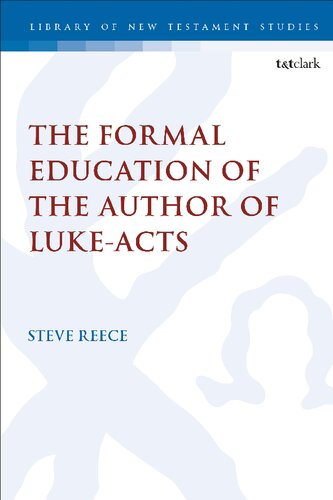Product desciption
The Formal Education Of The Author Of Lukeacts Steve Reece by Steve Reece 9780567705884, 9780567705907, 0567705889, 0567705900 instant download after payment.
Steve Reece proposes that the author of Luke-Acts was trained as a youth in the primary and secondary Greek educational curriculum typical of the Eastern Mediterranean during the Roman Imperial period, where he gained familiarity with the Classical and Hellenistic authors whose works were the focus of study. He makes a case for Luke’s knowledge of these authors internally by spotlighting the density of allusions to them in the narrative of Luke-Acts, and externally by illustrating from contemporary literary, papyrological, and artistic evidence that the works of these authors were indeed widely known in the Eastern Mediterranean at the time of the composition of Luke-Acts, not only in the schools but also among the general public.
Reece begins with a thorough examination of the Greek educational system during the Hellenistic and Roman Imperial periods, emphasizing that the educational curriculum was very homogeneous, at least at the primary and secondary levels, and that children growing up anywhere in the Eastern Mediterranean could expect to receive quite similar educations. His close examination of the Greek text of Luke-Acts has turned up echoes, allusions, and quotations of several of the very authors that were most prominently featured in the school curriculum: Homer, Aesop, Euripides, Plato, and Aratus. This reinforces the view that Luke, along with other writers of the New Testament, lived in a cultural milieu that was influenced by Classical and Hellenistic Greek literature and that he was not averse to invoking that literature when it served his theological and literary purposes.
This work identifies and evaluates the echoes, allusions, and quotations of Greek authors such as Homer, Aesop, Epimenides, Euripides, Plato, and Aratus in the Gospel of Luke and the Acts of the Apostles and accounts for them by proposing that the author experienced at least the primary and secondary levels of the traditional Greek education available in the 1st century CE in the Eastern Mediterranean world.
This is a monograph-length project on Classical and Hellenistic influences on the author of the Gospel of Luke and the Acts of the Apostles. The project begins with a thorough treatment of the educational system of the Eastern Mediterranean world during the Hellenistic and Imperial Roman periods. The educational curriculum was very homogeneous, and children growing up anywhere in the Eastern Mediterranean could expect to receive quite similar educations, at least at the primary and secondary levels. Reece’s close examination of the Greek text of the Gospel of Luke and the Acts of the Apostles has turned up echoes, allusions, and actual quotations of the very authors that were most prominently studied in the school curriculum. It is therefore his contention that Luke experienced a typical Greek education through the primary and secondary levels, but that he probably did not continue through the tertiary level, which concentrated either on rhetoric or philosophy. The monograph includes individual chapters on Homer, Aesop, Epimenides, Euripides, Plato, and Aratus. The monograph is intended for Biblical scholars, Classicists, students in graduate programs and divinity schools, and the interested public. Passages in ancient languages are translated by the author into English.


